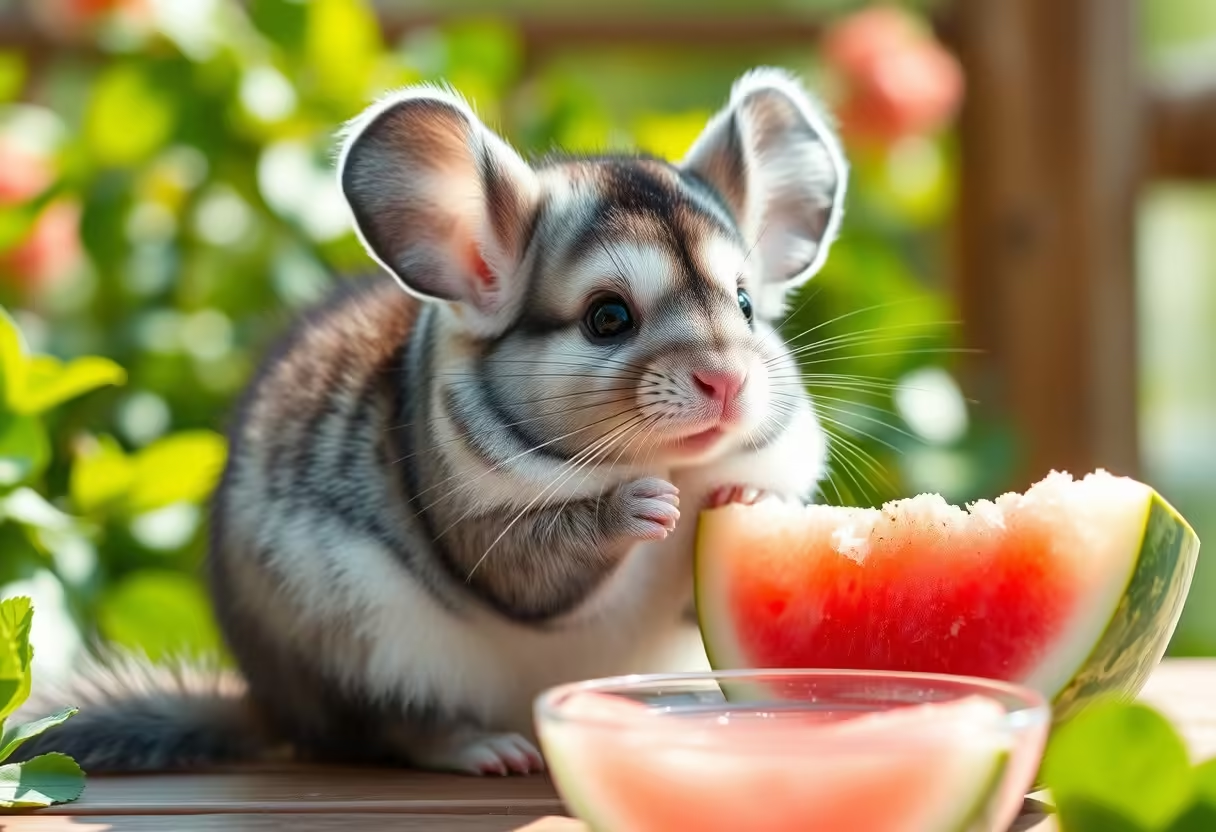Chinchillas are adorable, delicate creatures with very specific dietary needs. While watermelon might seem like a refreshing treat, is it actually safe for them to eat?
The short answer: No, chinchillas should not eat watermelon. Due to its high sugar and water content, watermelon can cause severe digestive issues, including bloat and diarrhea, which can be fatal for chinchillas.
According to veterinary experts, a chinchilla’s diet should be high in fiber and low in moisture, meaning foods like watermelon can disrupt their gut bacteria and overall health (LafeberVet, 2023, Merck Veterinary Manual, 2023).
Let’s dive deeper into why watermelon is unsafe and explore healthier treat alternatives for your furry friend.
🚨 Why Watermelon is Unsafe for Chinchillas
❌ 1. Too Much Sugar
A single cup of watermelon contains 6 grams of sugar, which is far too high for a chinchilla’s sensitive digestive system (Purdue University Veterinary Medicine). Excess sugar can lead to:
- ✔️ Obesity – High-sugar diets can contribute to weight gain, which is linked to joint issues and heart disease in chinchillas.
- ✔️ Diabetes – Studies show sugar disrupts insulin regulation in small mammals (National Library of Medicine, 2022).
- ✔️ Digestive distress – Sugar ferments in the gut, causing gas and bloating, which can be fatal if untreated.
❌ 2. High Water Content = Digestive Issues
Watermelon is over 90% water, which chinchillas are not equipped to handle. Consuming high-moisture foods can cause:
- ✔️ Diarrhea – Excess water softens stools, leading to dehydration (Journal of Exotic Pet Medicine, 2021).
- ✔️ Bloating (which can be fatal) – Chinchillas cannot pass gas efficiently, so bloating can cause pain and intestinal blockages.
- ✔️ Disrupted Gut Flora – A moisture-rich diet leads to harmful bacterial growth, increasing the risk of gastrointestinal infections.
❌ 3. Lack of Essential Nutrients
Chinchillas need a fiber-rich diet to stay healthy (University of Liverpool Veterinary Practice). Watermelon does not provide the fiber and essential nutrients that chinchillas need for digestive balance and dental health.
✅ What Should Chinchillas Eat Instead?
- A healthy chinchilla diet should be:
- ✔️ 80-90% hay (Timothy hay, orchard hay)
- ✔️ 10-15% chinchilla-specific pellets
- ✔️ Limited healthy treats (tiny portions of dried herbs, flowers, or safe vegetables)
🟢 Safe Fruit Alternatives (Only in Dried Form & Rarely!)
- Since fresh fruits contain too much moisture, chinchillas should only have dried fruit in very tiny portions (less than 1 tsp, once a week max):
- ✔️ Dried apple (NO seeds!) – High in fiber, low moisture
- ✔️ Dried rose hips – Vitamin C boost & good for digestion
- ✔️ Dried goji berries – Rich in antioxidants, but only sparingly due to natural sugar
🔴 AVOID dried bananas, raisins, or pineapple – too much sugar!
👉 Important: Always consult a veterinarian before introducing new foods (The Veterinary Nurse Journal).
🟢 Safe Vegetables for Chinchillas
Unlike fruit, some vegetables can be great additions to a chinchilla’s diet in small amounts:
- 🥬 Kale – High in fiber, low in sugar
- 🥕 Carrots – Contains beta-carotene for eye health
- 🫑 Bell peppers – Low in sugar, high in vitamin C
❗ Introduce new veggies gradually to prevent digestive upset (LafeberVet).
⚠️ What Happens If a Chinchilla Eats Watermelon?
If your chinchilla accidentally nibbled on watermelon, monitor them closely for 24 hours for these warning signs:
- 🔴 Diarrhea – Loose stools indicate gut distress
- 🔴 Lethargy or unusual behavior – Could signal dehydration or bloating
- 🔴 Loss of appetite – A dangerous sign in chinchillas
- 🔴 Swollen stomach (a sign of bloating, which is an emergency!)
🚑 If you notice these symptoms, contact your vet immediately!
🙋♀️ FAQ: Common Questions About Chinchilla Diets
Q: Can chinchillas eat watermelon rinds or seeds?
❌ No! The rind and seeds are even harder to digest than the fruit itself and may cause intestinal blockages.
Q: Can chinchillas eat fresh fruits at all?
🚫 Fresh fruits are not ideal due to high moisture content. Stick to dried fruits in very small amounts (The Veterinary Nurse Journal).
Q: What’s the best diet for a chinchilla?
✅ Hay (80-90%) + Chinchilla-specific pellets (10-15%) + Limited dried herbs/veggies as treats.
Q: What fruits are toxic to chinchillas?
🚨 Avoid:
❌ Citrus fruits (orange, lemon, grapefruit) – Too acidic
❌ Bananas – Too sugary
❌ Grapes/Raisins – Potential kidney toxicity
🔎 Final Verdict: Should You Feed Watermelon to Chinchillas?
🚨 No—watermelon is NOT safe for chinchillas! 🚨
✔️ It’s too high in sugar
✔️ It’s too watery
✔️ It lacks essential nutrients
Instead, provide a balanced diet rich in hay, chinchilla-safe pellets, and the occasional dried herb or veggie.
Have questions about your chinchilla’s diet? Drop them in the comments below! 👇
📌 Helpful Resources & References
🔗 LafeberVet – Chinchilla Nutrition Guide
🔗 Purdue University Veterinary Medicine – Exotic Animal Diets
🔗 University of Liverpool Veterinary Practice – Chinchilla Care
🔗 The Veterinary Nurse Journal – Chinchilla Husbandry
🚀 Want More Chinchilla Care Tips?
📌 Follow us for expert pet care advice!
📌 Share this to help other chinchilla owners!
